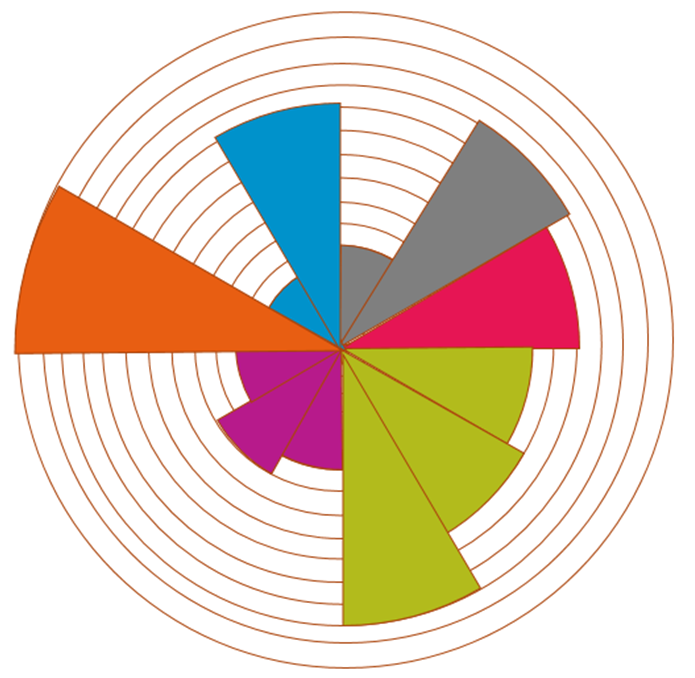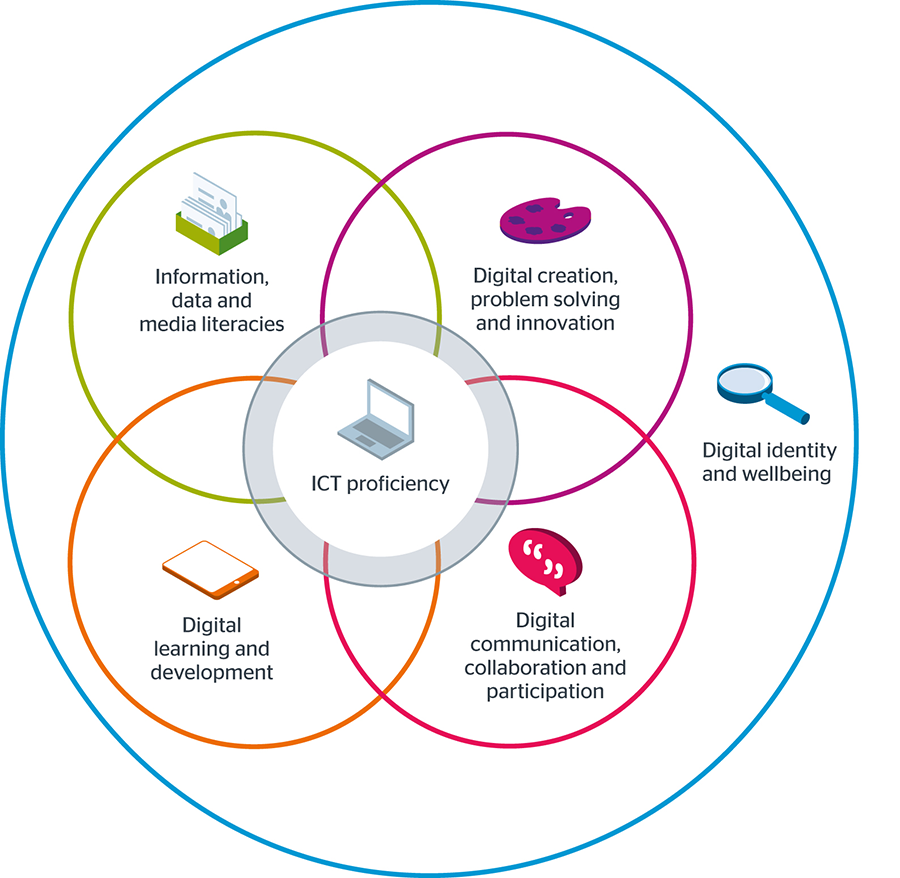Digital Capability Discovery Tool
The Digital Capability Discovery Tool is an empowering first step for staff and students to reflect on their digital capabilities and to identify current strengths and areas for development.
What is the Discovery Tool?
The Discovery Tool is a developmental tool that students and staff can use to self-assess their digital capabilities, identify their strengths and opportunities to develop their skills further to enhance their practice of learning.
The Discovery Tool gives you the opportunity to find out more about your own digital capability through a series of reflective questions and will provide you with feedback; a summary describing your capability, a list of possible actions that you can take to build your capability and links to resources and content that you can use to support your development in that area of digital.
If you don't have time to do the self assessment now but you want to find York St John and external resources to help develop your digital capability, you can click on the links below which map to each of the broader digital capability categories:
Digital creation, problem solving and innovation
Digital communication, collaboration and participation
Digital identity and wellbeing
Digital learning and teaching
ICT Proficiency & Digital Productivity
Information, data and media literacies
What data is collected & why?
Staff are asked to select their Department & Subject Area (from a standard list), and Students are asked to select their Level of Study & Subject Area (from a standard list).
This is to enable us to receive a breakdown of our institutional data (anonymised so no individual is identifiable) by these categories, and we use standardised (non-customisable) department and subject lists to enable us to compare our outcomes with others in our sector.
How can I access the Discovery Tool?
You can login at jisc.potential.ly using your YSJU username and password.
Using the Discovery Tool: Questions
Once you have signed in, you will see the ‘HE Teacher’ and ‘Explore Your Overall Digital Capabilities’ question sets on your dashboard.
The questions are developmental and designed to foster understanding rather than to test knowledge. They reflect real world digital practices and have been reviewed by an expert panel and checked against professional profiles.
Take your time to answer all the questions. There are two kinds of questions that appear in question sets:
- • Activity questions – select all the digital activities that you do, from the range provided
- • Confidence questions – rate your confidence with a digital practice or skill
You can leave a question to return to later, or go back and change your answer, using the ‘next’ and ‘previous’ buttons. You can also save and exit if you want to go back and complete some of the questions later.
You will be asked to complete any questions you have missed before submitting your answers. Once you have submitted your answers, you will receive your report.
Using the Discovery Tool: Resources
The Discovery Tool provides links to a wide range of resources for each of the digital capability framework areas and for specific activities relating to the question sets, such as teaching, library and learning resources, research.
The platform delivers these resources in two ways:
- Browse resources in the discovery tool via the resource bank
- Within your personal question set reports
Here you will find a range of resources that you can browse through that have been mapped to the different elements of the digital capability framework and other elements used in the question sets. The very first set of resources you will see provide an insight to what digital capabilities are and how they can help you live, learn and work in a digital society.
Using the Discovery Tool: Individual Report
Your report provides a visual representation of your scores along with (for each element):
- • A definition/description of the element
- • The level at which you have assessed yourself
- • What your level means, in relation to the element
- • Advice about ‘next steps’ to consider if you want to develop further
- • Links to relevant resources
The report will help you to identify your strengths as well as opportunities for further development, and highlight resources that can help.
The scores you give yourself for each element of digital capability will be shown in your report as one of three levels: developing, capable or proficient. We use these levels to make sure you are shown relevant feedback.
If an element is very important in your job role, we suggest you focus on how you can improve, consolidate, or gain recognition for, your skills in this area. Otherwise it’s up to you whether you choose to focus on your strengths, or develop your digital practice in other areas.
We hope that you will return to the discovery tool in the future, for example to access the resources that interest to you, or complete the questions and assess yourself again.
Please note that retaking a question set will remove your previous responses. If you want to track your progress you should download a PDF of your previous report to keep, before starting the questions again.
You can download a copy of your report to review in your own time – we hope it will encourage and inspire you! You might want to share your report with others, for example as part of your professional development. You might also be offered help to understand your report and plan what to do next. But nobody sees your report unless you allow them to!
Digital Capability
The Jisc Digital Capability Framework provides a structure to help individuals understand what skills are needed and supports the development staff & students. Following extensive sector-wide consultation, and an evidence-informed approach to development, Jisc have produced an initial model of the framework which describes digital capability as six overlapping elements: ICT Proficiency; Information, Data & Media Literacies; Digital Creation Problem Solving & Innovation; Digital Communication, Collaboration & Participation; Digital Learning & Development; and Digital Identity & Wellbeing.
For a more comprehensive definition of each of these six core elements see Building Digital Capabilities: The Six Elements Defined.
Digital Capabilities can be defined as the skills and/or competencies required for living, learning and working in a digital society. (Jisc, 2015)
Digital Strategy
Working to the University Digital Strategy 2017-2020, in partnership and collaboration with Schools, Directorates and other stakeholders, we hope to identify what digital skills are required of our staff and students, provide advice and guidance on meeting these needs, and ensure we are equipping students and staff with the tools and resources they need to improve digital capability at a local or institutional level through on-going consultation and development.
Developing Digital Capability
To avoid digital capability being ‘yet another thing’ for staff and students to work into their busy lives, it is useful if they can be linked with other initiatives, woven into existing processes, and reflected in strategy. For example, existing work on the YSJ Pedagogy, the Inspiring Learning & Teaching, Clear About Career, and Impactful Research Strategies.
Developing successful staff-student partnerships will be paramount to the successful embedding of the Digital Capability Framework. The curriculum is the main focus of students’ attention and driver of effort so is potentially the best route to showcase and develop digital practices.
In order to embed digital capabilities in the curriculum, staff need to be engaged and will need continued support and development as the practices they model will become examples for students. Through engagement with this Framework and active consideration of what and how staff use technology to facilitate learning and teaching, they will also be aligning their practice to the UK Professional Standards Framework (UKPSF), and elements of the Vitae Research Development Framework (RDF).
Developing staff digital capability will also support an expanding range of study and research options, and will enable our students to further develop skills for learning in a digital society.
Staff and students involved don’t need to be technology experts; communications skills, flexibility and an eagerness to learn and share are much more important as we seek to widen awareness and develop communities of practice.
Finally, addressing digital identity and digital wellbeing not only promotes personal and professional development, but also the health and wellbeing of our staff and students.


